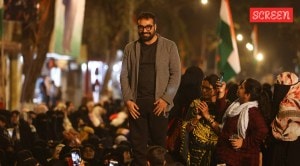Kalyan village residents unanimously oppose Adani group’s cement grinding plant
The all-party delegations, trade union leaders, local fishermen, farmers and youth from Mohone and surrounding villages as well as from nearby towns of Kalyan, Ulhasnagar, Dombivli unanimously opposed the project.
 Parag Patil, a youngster from Atali village questioned the environment summary report prepared for the project claiming inadequate explanations on various issues concerning pollution.
Parag Patil, a youngster from Atali village questioned the environment summary report prepared for the project claiming inadequate explanations on various issues concerning pollution.Days after The Indian Express reported on locals opposing a grinding plant of Ambuja cement, an Adani group company, at Mohone village near Kalyan town, around 68 kms from south Mumbai, hundreds of people from different backgrounds, political parties and occupations on Tuesday registered the opposition at a public hearing called by Maharashtra Pollution Control Board (MPCB).
The all-party delegations, trade union leaders, local fishermen, farmers and youth from Mohone and surrounding villages as well as from nearby towns of Kalyan, Ulhasnagar, Dombivli unanimously opposed the project.
The MPCB and the company officials however maintained that the project will not cause any pollution and the proposed plant is merely a grinding plant and not an integrated cement manufacturing one.
“The public hearing is part of the process whereby environmental clearance (EC) is given to certain projects. This project is a cement grinding plant and since it is coming up at the old NRC location, the majority of grievances are about the pending dues. This is not an integrated cement plant but a grinding plant. Since most of the questions were about pending dues and land title, we are not linked to it. We answered questions related to air and water pollution,” said Jayvant Hajare, regional officer of the Kalyan office of MPCB.
He said that the MPCB gives consent to the plant after the EC. “Public hearing is part of the EC process. It is to let people know about the project and listen to their opinions. There is no EC yet. Once they get it, then they (the company) will go for consent. As of now, no ECs have been given,” he said.
The project, being planned at the erstwhile National Rayon Company (NRC), was established in 1945 in Ambivli near Titwala on an area of 450 acres. Back then it was in the outskirts of Mumbai, which led to the establishment of a staff colony, school, hospital and other amenities.
Over the years, the Mumbai Metropolitan Region has expanded and urbanisation has grown much beyond Thane and Kalyan Railway junction. The company discontinued production in 2006 and a lockout was put in place in 2009. A dispute erupted between the labour union and the company over unpaid dues, which continues even today. After a prolonged battle in the NCLT, Adani group acquired the entire NRC property in 2020.
Trade union leader Uday Chowdhari, Sanklpana Gavhane of Bharatiya Mahila Federation, Asha Rasal of Shiv Sena (UBT), Subhash Patil, local BJP leader, Shyam Gaikwad of RPI, former corporators Dayashankar Shetty, Jivandas Katariya as well as several locals raised questions on the dues of workers, pollution as well as not fulfilling technical criteria.
“The land title is still not clear as the matter is pending in the appellate court of the NCLT. Instead of a polluting industry, we would have welcomed an IT park,” said Katariya.
Parag Patil, a youngster from Atali village questioned the environment summary report prepared for the project claiming inadequate explanations on various issues concerning pollution.
Prakash Dayal of Ambuja Cement, who was present at the public hearing, said that the project was a standalone unit which will only grind and pack cement. “We will be following all the laws and rules related to environment and pollution,” Dayal said, adding that there were no scientific studies to prove any disease was the result of a cement grinding plant. He added that the plant had nothing to do with burning coal, which causes air pollution.








